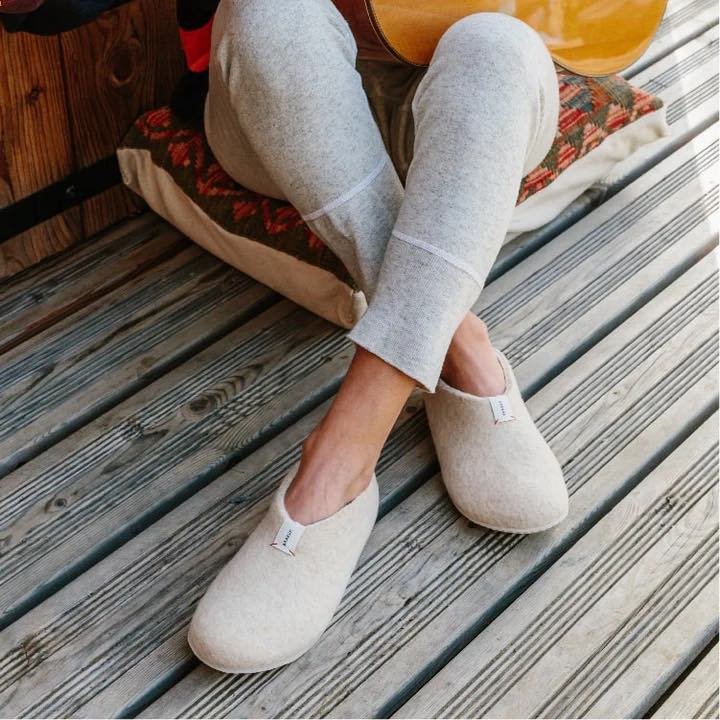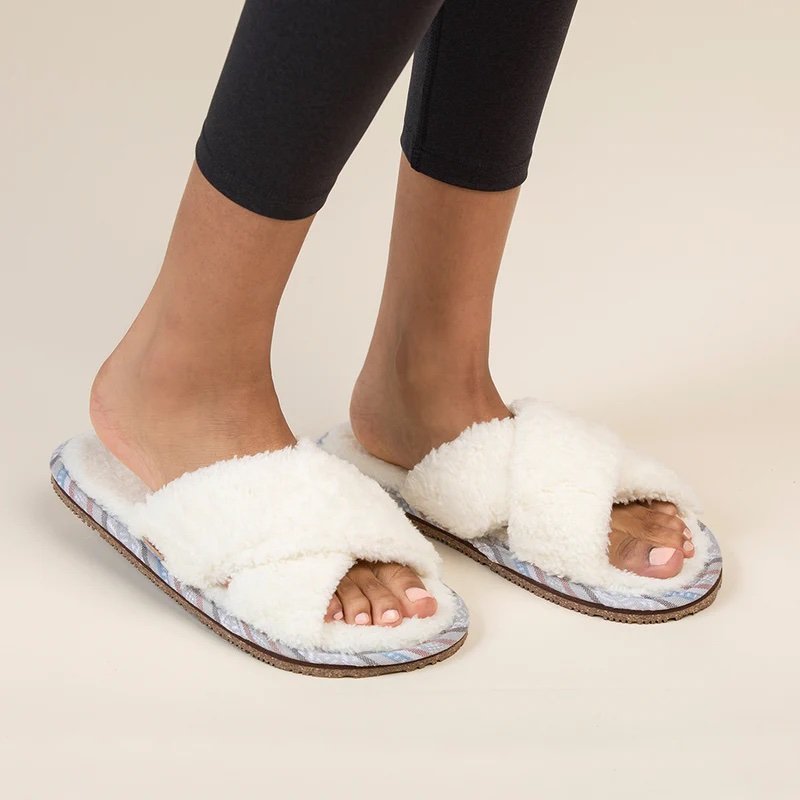The Coziest Ethical & Eco-friendly Slippers to Stay Warm
Everyone loves a cozy pair of slippers. They are the universal symbol of rest, relaxation, and self-care.
Because of this, there are a lot of slipper designs and styles out there.
However, most of them are cheap and mass-produced, and definitely not good for the environment.
So where can you find ethical, eco-friendly, sustainable slippers to keep you warm and cozy?
In this guide, we’ve highlighted some of the best ethical and eco-friendly slippers you can buy right now.
If you have been thinking about getting a pair (or two!) for yourself, your family, or that special someone in your life, this is the perfect place to start.
This post does contain affiliate links. The Honest Consumer will receive a commission if you decide to make a purchase. Our commission is at no additional cost to you.
7 Eco-friendly Slipper Brands
If you're looking for some sustainable slippers this list is a great start. These eco-friendly shoe brands make some of the best eco-friendly slippers on the market.
Discover sustainable wool slippers, handmade slippers, vegan slippers, and more.
Allbirds Slippers Made with Natural & Recycled Materials
Price: slippers are $68 per pair.
Allbirds is a New Zealand-American company that is famous for making comfy slippers while still remaining sustainable.
Their line of slippers is gender-neutral and comes in five different colors.
The company is a certified B Corp brand. It prides itself in its transparency and high ethical standards.
They also make great slippers that are super comfy, which is why they’ve made it to this list.
Allbirds slippers are made with upcycled wool, recycled polyester, and FSC-certified natural rubber.
All the slippers are ethically made in South Korea.
Baabuk’s Ethically Made Wool Slippers
Price: slippers start at $69 a pair.
Baabuk is known for its felted wool slippers that are exceptionally comfortable. They exclusively use sustainable products that are eco-friendly, durable, and biodegradable.
Because of how the slippers are made, they do not lose their shape and will look good for many years.
Baabuk is a family-owned business that was founded 10 years ago. The natural wool they use in their slippers comes from New Zealand.
Their wool suppliers use humane farming practices during shearing, creating an ethically made renewable fiber.
Because the company has full control over its entire production process and supply chain, they are able to ensure high ethical standards in all its practices.
Their factory workers are paid well and the company supports women with high paying wages. This is why they are a B Corp Certified company.
Sustainable shoppers can discover a wide range of colors.
Kyrgies Artisan Made Natural Wool Slippers
Price: Kyrgies slippers start at $49 a pair.
Kyrgies slippers are made using felted wool that comes from small family-run farms. Each slipper is made by hand using traditional methods in Kyrgyzstan.
The Kyrgies are non-slip house shoes featuring beautiful molded arches.
You can see the handiwork that has gone into each pair as well as the traditional felting techniques that only use wool, soap, and low-impact dyes.
The soles of the slippers are also tanned traditionally without using chrome or chromium, which have a negative environmental impact. Kyrgies partners with a woman run factory and skilled artisans who make the slippers are paid a living wage.
The Kyrgies brand is committed to adhering to human and environmental standards, which is why they are certified to be climate neutral and a member of 1% for the planet.
Kyrgies slippers are available for both adults and children. They come in a wide range of colors and styles to suit every taste!
I’ve personally worn Kyrgies for a few years and really enjoy them!
Rothy’s Indoor & Outdoor House Shoes
Price: their sustainable slippers range from $130-$170.
Rothy’s crafts their shoes from eco-conscious materials such as recycled plastic water bottles, plant based materials, & algae-based foam.
Rothy’s cozy slippers feature an upper which is knit with a blend of RWS-certified merino wool and Rothy’s signature thread featuring recycled plastic bottles.
Just like all things Rothy's, our merino slippers are machine washable and durable. This makes them great for wearing both indoors and outdoors.
Their sustainable slippers feature options for men and women.
FeelGoodz Vegan Slippers
Price: slippers range from $10-$60.
FeelGoodz is an eco-conscious footwear company that makes premium footwear using sustainable materials. The company is also committed to fair trade practices as well as conscious sourcing for all its products.
FeelGoodz slippers are made by local artisans in Vietnam. The FeelGooz design team works directly with the artisan communities who meticulously hand-dye yarns and weave on traditional looms.
Their cozy, handmade slippers feature soft faux sherpa, artisan woven detail, and natural rubber and recycled rice husk soles.
Apart from being warm and cozy, you’ll also love how their slipper designs are inspired by the vibrant colors and weaving traditions of Vietnam.
These vegan fair trade slippers feature options for men, women, and children.
Are slippers made with toxic/harmful materials?
The process and materials used in the production of slippers vary depending on the brand, the equipment used, and the type of slipper.
Most mass-produced slippers that are made in factories use energy, water, and other resources to make them, including materials that are made of harmful or toxic chemicals.
Modern slippers have several parts that can be made of a large variety of materials. Common choices include leather, plastic, cloth, and rubber.
Some slippers will also incorporate materials like polyurethane foam, ethylene vinyl acetate, and liquid silicone or gel.
While most of these materials will work well for the slipper in performing the roles they are meant to, they are often impossible to recycle once the slipper can no longer be used.
What eco-friendly materials should consumers look for and why?
Now that you know just how much mass-produced slippers can affect the environment, you now understand why it is so important to go the sustainable route when buying slippers.
But what eco-friendly materials should you look for and why?
Natural Materials
When it comes to slippers, natural materials are a great option. Ensure that the material used to make the slipper is also ethically sourced.
Great examples are organic cotton, bamboo, responsibly sourced wool, and hemp, although any biodegradable material that reduces its own sourcing and manufacturing footprint will work.
Recycled Materials
Slippers that are made using recycled materials are also a great choice.
The use of recycled materials helps divert waste from landfills while reducing the need for fresh materials at the same time.
You should also think about how the materials are sourced.
Ethical sourcing includes practices that are used to make the slippers, how the materials are sourced or grown, how the final products are assembled, and the conditions under which the people who make the slippers work.
Special certifications like Fair Trade Certified, Fair Trade Federation, and other third party certifications can be helpful here.
Whether you are a long-time slipper lover or you just want to get something nice for that special someone, you cannot go wrong with ethical and eco-friendly slippers.
We hope that this guide has given you high standards on your search for slippers and presented you with some of the best options for ethical brands that are making a positive impact. Good luck!
More Sustainable Cozy Style Content to Read
For more tips & tricks on sustainable living be sure to follow The Honest Consumer on social media, subscribe to our newsletter, & check out the Ethical & Sustainable Brand Directory.










